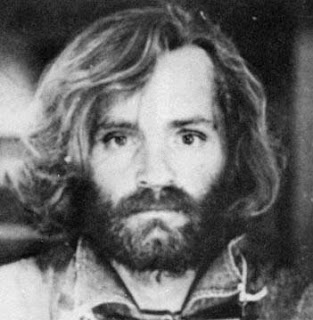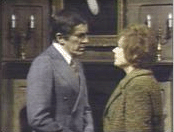The definition of a villain lies in the eye of the beholder. According to Merriam-Webster, a villain is "a character in a story or play who opposes the hero." But what if the villain is the hero? In other words, the protagonist. Does that change anything, such as the perception we have of him? Conversely, does it make the good guys the heroes? I guess it depends on your point of view.
I just finished watching the pitifully few episodes of Profit that were made. It was never picked up for a second season, and never given resolution. At one time, shows had the plug pulled and never had the opportunity to wrap everything up in a neat little package, knowing they'd been cancelled. Hence, we left the brave castaways still shipwrecked on Gilligan's Island ('til many years later, when the miracle of TV movies rescued them at long last). The bad thing about this scenario is that we don't find out the answer to the burning questions we have regarding our favorite characters. Of course, on the other hand, some series that were allowed to do this, did it pretty ridiculously and we'd have been better served if they'd simply avoided it. One example of this is St. Elsewhere, whose resolution involved an austic boy's dream. The entire series. Seriously? That's worse than the Bobby-dream sequence season of Dallas, which was horrible too, but at least we only lost one season. In the case of St. Elsewhere, it was all in a child's head, nothing more.

Profit was the brainchild of David Greenwalt and John McNamara, produced by Stephen Cannell. The trouble with Profit is that it was ahead of its time. Cable networks weren't what they are now, and although it was picked up by Fox, it proved to be too edgy for mainstream television audiences. I'm convinced, to quote Judas in Jesus Christ Superstar: If you'd come today, you would have reached a whole nation. Okay, maybe he was talking about Israel in 4 B.C., but you get the point. If Profit were to air now, it would be quite successful, of that I have no doubt.
The protagonist of Profit is, of course, Jim Profit, played by the delectable Adrian Pasdar. He is the hero, but arguably he is also a villain. He will stop at nothing to get what he wants - power, wealth, control - inside of G&G, Gracen & Gracen, his employers.
****SPOILERS****** A little background first. Jim Profit was born Jim Stawowski in Tulsa, Oklahoma. His father was worse than neglectful, he was abusive. He stuck the year old child into a large cardboard box, with a slit cut out through which he could view the television; once a week he threw in food and supplies. The television was Jim's only contact with the outside world. He grew to hate it once he became an adult. He decided to make a place for himself at G&G - not surprisingly, the box was one of theirs, the only family he has really known. As the series began, Jim has just received a promotion following the death of the former VP of Acquisitions at G&G. G&G is a family-owned business. Chaz Gracen is the CEO, bumbling brother Pete is Senior VP of Acquisitions; Jack Walters is married to their cousin, and is President of Acquisitions (but not for long); Joanne Meltzer (Lisa Zane) is Jack's ex and the obsessive head of Security who is determined to destroy Jim Profit at all costs.

And then there's Bobby (Lisa Blount). We first see her in the pilot, at the end of the first hour. Jim is told he has a visitor in his office. He enters, sees her and closes the door, whereupon the woman practically throws herself into his arms and they proceed to kiss rather warmly. When they finally pull apart, she greets him with, "Hello Jimmy," and he responds with, "Hi Mom". Yeah, right. I was very amazed myself at first, until it's revealed that she's his stepmother, not his biological mother. However, I learned when I watched the extras on the dvd that originally Bobby was his mother, and that the reason for the first rejection of the series was due to that. Fox picked it up, but before it was actually shot, they requested the change to stepmother.

Every good villain needs a sidekick, right? For Jim Profit, it was Gail Koner (Lisa Darr). She's Jack's assistant, and a nice person. But he learns her secret (everyone has at least one) - she's skimming a few cents here and there, in order to make her mother more comfortable in the nursing home she's in. Jim thinks that's an admirable motive - as he tells her when he reveals his knowledge of her crime - and would she please do him a favor? Thus begins their relationship. Gail ends up as Jim's assistant, and he leads her down the path of... well, that's for you to decide. Personally, if that were me, I'd have no problem doing what he asks of her. He's charming, sexy, handsome, intelligent. Did I say drop dead gorgeous? Is Gail a good guy or bad guy? I guess that depends on how your moral compass swings. And how you view Jim Profit. In just the few episodes made, you can watch her evolution from unwilling accomplice to trusted sidekick, her dreams of being a player in this world shattered by indifferent corporate execds - until Jim Profit takes her in hand. . I like to believe that under Jim's tutelage, someday she achieved her goals.

Jim uses whomever he needs to use. He exploits the loneliness of drunken Pete's wife Nora, becomes her friend, hints at more, plans a romantic assignation, but at the last minute tells her he cares too much to do that to her.(But he manages some mighty fine manipulation in the process) When he finally kills his father - an action begun when he was fifteen (Jim handcuffed him to the bed and set the trailer on fire, then took off), he thinks he's rid of his stepmother, but the plucky Bobby has other ideas. She's loud, brash, loose and amoral. She loves to live high on the hog but she doesn't want to do any more work than is involved in spreading her legs. And she knows the value of an audio recording. So he tolerates her, and has to give in to her demands, material and otherwise, for now. And yes, he continues to service her as well. At least he goes through the paces. You just know she broke him in, years ago. Theirs is a love/hate relationship, as much as Jim can feel love. Which isn't much.

One of the most shocking, haunting, mind blowing images you'll ever want to see occurs at the end of the pilot. Throughout the series, you see Jim at home at his computer, sitting before it in the nude. He has a secret area in his apartment, where no one is allowed, where he makes his Machiavellian plans. You might think he's attempting to wrest control of G&G, but you'd be wrong. He doesn't wish to step into the light, he chooses to remain in the shadows. To be the power behind the throne. To eliminate everyone who gets in his way. In the pilot, he gets a program, thanks to Gail, which gives him virtual access to G&G, and everyone's files, including digital representations of everyone there. He delights in blowing up these 3-D images as he destroys each person.

But about the image. As I said, he spends a lot of time at this computer, scheming, sitting there in the nude (if you're hoping to see something, remember - this was shown on Fox, not happening). At the very end of the pilot, when he calls it a night and retires, we see what we haven't seen before - he has THE box, there in his little sanctuary. The one he was brought up in. (If not the very one, then the same type, we're never sure, but it's definitely a G&G box). And he curls up in it and sleeps there, every night. I'm telling you that was one hell of a surprise, and that image is indelibly burned into my brain.
I realized while watching the extra something that probably explains at least part of my attraction to Jim Profit. It's that whole power behind the throne angle. Just like the man who's my historical crush - Cardinal Armand Jean Duplessis Richeileu. Although he virtually ruled France for many years, he was content to appear to be the king's right-hand man. Richelieu was a very complex and fascinating character. And yet if you ask most people today about him, they'll say he was a villain. Why? Most likely because Alexander Dumas painted him that way in his Musketeer books, a portrayal which has been replicated in the film versions. It's all a matter of perception.
So there you have it - Jim Profit is my modern day Cardinal Richelieu. No wonder I'm attracted to him.
Sinner or Saint? You make the call. There is no right or wrong. I recommend that you check out Profit - you'll be glad you did.
Until next time, take care!
♥ Julie








































